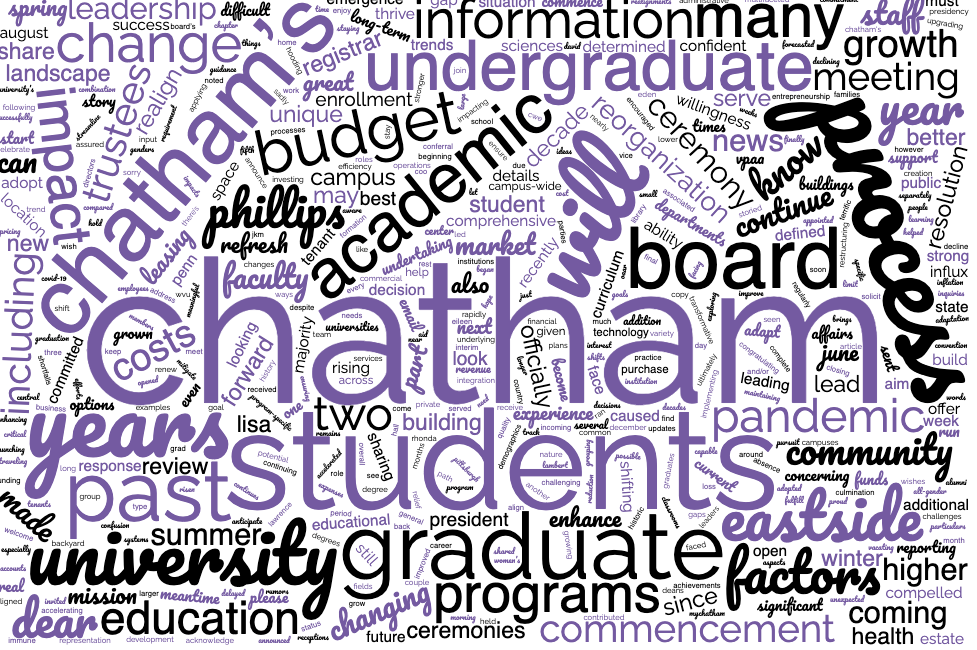Our administration has made one thing and one thing only clear over the course of the reorganization: it’s allergic to email. After the email announcing the upcoming changes in June, I can count on one hand the number of emails the entire student body has received about our school-wide reorganization.
Chatham University’s reorganization is to make up a deficit that was “well over $12 million” but has been decreased to nearly $6 million, according to President Rhonda Phillips in an interview with the Communiqué in September. Dr. Phillips wrote in a recent email that she wants to communicate with us about important matters in person in an “information and email saturated world.”
The reality, though, is that the lack of more frequent updates via email from the University is leading to the spread of mis- and disinformation.
In early September, one of my classrooms was abuzz with discussion of the reorganization. In her email, Dr. Phillips said face-to-face conversation, her preferred mode of communication, is “one of the best aspects of college life,” and that an email or social media post could never make up for the experience. But I saw firsthand just how scared and confused Chatham’s lack of communication left us.
My classmates discussed a Reddit post that gave them more information about the University they are paying thousands to attend than any emails prior. One student suggested Chatham would be bought by Carnegie Mellon University, another shared a conspiracy theory that Eden Hall is a money-laundering scheme. While neither of these are true, these discussions are concerning reflections of a larger issue.
This is what a lack of communication is doing. Students are so desperate for any information that the best we can do is discuss social media posts from unknown sources and suggest an infinite number of erroneous explanations for what Chatham is doing financially.
If the administration and president are truly committed to communicating with us, they need to find more ways to communicate with all of us, tell us more and involve us in the decision-making process.
Almost all the administrators I have spoken to encouraged students to reach out if they had concerns, and Dr. Phillips clearly values in-person conversations with students, but the burden shouldn’t fall on students to reach out.
Not every student can take time out of their day to meet the president. It’s hard enough to organize that on a full-time student’s schedule, let alone a university president’s schedule. Leaving students on their own to hunt down information during the term instead of providing it is so ridiculous I can’t find a metaphor strong enough to condemn it.
And Chatham has shown that better communication is possible; it has made great strides in addressing issues with communication since the reorganization was announced. Dr. Phillips assembled a student group to address issues, suggest ideas and give feedback. While this is progress, not every student has an opportunity to be a part of this group, and we need ways for the entire student body to get involved. Chatham could hold a monthly public forum that students can attend to get answers, raise their concerns and have productive conversations with administration.
Staff and faculty have a “University Reorganization” page on my.chatham.edu where they can view frequently asked questions, campus updates and submit questions and ideas that will be viewed by administration. Expanding this to students would provide a venue for students to easily voice their opinions and get information.
Chatham’s future is our future, and we cannot continue being left in the dark about what’s to come. Making up the deficit will not be pretty, simple or easy, but if these decisions are going to be made, make them with us.
This is my message to the administration: we care about this school. Let us care about it. We want to make this place better.
And we shouldn’t have to fight to get answers.
The Board of Trustees sent the first email announcing the reorganization to staff and faculty at 10:10 a.m. on June 26. Six hours later, it was forwarded to students. It was 751 words long, and that’s including the email signature. To put that in context, this article, even without the headline, is exactly 752 words long.
You have just read more words in this article than Chatham used to announce a campus-wide reorganization to make up a deficit of over $12 million. If I can write this article, our University can tell us more about what’s happening to our school.



